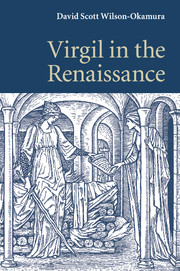Book contents
- Frontmatter
- Dedication
- Contents
- Illustrations
- Acknowledgements
- Texts and abbreviations
- Introduction
- Part I Publication
- Part II Reputation
- Chapter 2 Patronage and the Eclogues
- Chapter 3 Variety and the Georgics
- Chapter 4 Morals and minimalism
- Part III Interpretation
- Appendix A Virgil commentaries in Latin editions, 1469–1599
- Appendix B Virgil commentaries ranked by number of printings
- Index
- References
Chapter 3 - Variety and the Georgics
from Part II - Reputation
Published online by Cambridge University Press: 05 March 2014
- Frontmatter
- Dedication
- Contents
- Illustrations
- Acknowledgements
- Texts and abbreviations
- Introduction
- Part I Publication
- Part II Reputation
- Chapter 2 Patronage and the Eclogues
- Chapter 3 Variety and the Georgics
- Chapter 4 Morals and minimalism
- Part III Interpretation
- Appendix A Virgil commentaries in Latin editions, 1469–1599
- Appendix B Virgil commentaries ranked by number of printings
- Index
- References
Summary
We do not display greatness by going to one extreme, but in touching both at once, and filling all the intervening space.
Pascal, Pensées §353 (trans. W. F. Trotter)Virgil’s Georgics was sometimes assigned in schools, but it was never as widely studied as his Eclogues – almost no poem was – or his Aeneid. The Georgics was imitated, but not to the extent of defining a genre, as the Eclogues defined pastoral and the Aeneid defined epic (especially for readers who did not know Greek). One reason was terminology. In the sixteenth century there were, as we shall see, many poems modeled on the Georgics, but “georgic” was not established yet as a separate genre; it was the name of a book (as in the phrase “Virgil’s third georgic”) but not of a mode or kind. In the Renaissance there were commentaries on the Georgics, but no theories of georgic poetry.
The theme was different as well. In scholarship today, the phrase labor omnia vincit (Geo. 1.145, “labor conquers everything”) is routinely cited as “[t]he central principle of the Georgics.” The orthodoxy on this point is so secure that it seems self-evident, but it was not so in the Renaissance. In the fifteenth and sixteenth centuries, the most popular commentators on the Georgics were the same ones who were popular on the Eclogues: the ancients Servius and Probus, and the moderns Mancinelli and Badius Ascensius. Naturally, when Virgil does write about labor, the commentators do so as well; but they do not make it the theme of the whole poem. Servius, for example, when he explains labor omnia vincit, says only that no one loves labor; Mancinelli, that Virgil’s phrase has an echo in the newly discovered text of Manilius on astronomy; Badius, that necessity is the mother of invention; and Probus says nothing at all.
- Type
- Chapter
- Information
- Virgil in the Renaissance , pp. 77 - 100Publisher: Cambridge University PressPrint publication year: 2010



